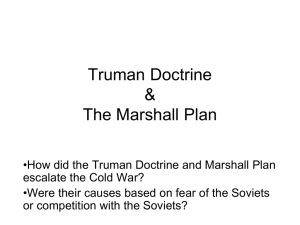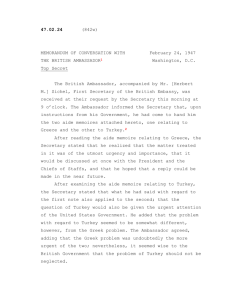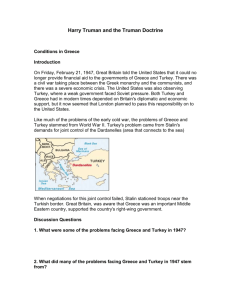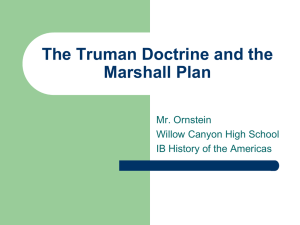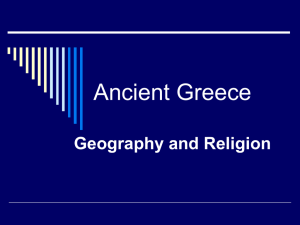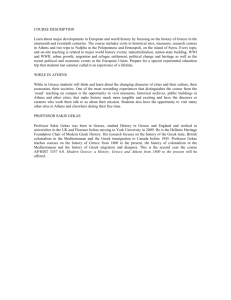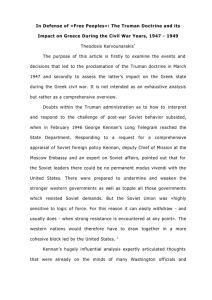STATEMENT TO CONGRESSIONAL LEADERS February 27, 1947
advertisement
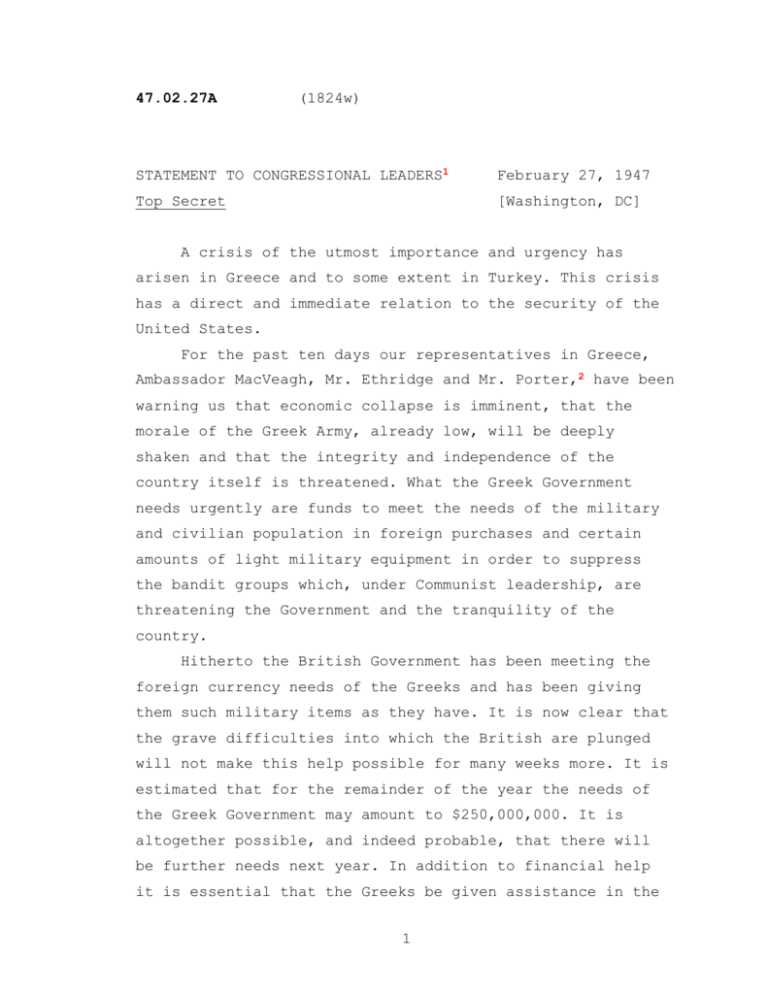
47.02.27A (1824w) STATEMENT TO CONGRESSIONAL LEADERS1 February 27, 1947 Top Secret [Washington, DC] A crisis of the utmost importance and urgency has arisen in Greece and to some extent in Turkey. This crisis has a direct and immediate relation to the security of the United States. For the past ten days our representatives in Greece, Ambassador MacVeagh, Mr. Ethridge and Mr. Porter,2 have been warning us that economic collapse is imminent, that the morale of the Greek Army, already low, will be deeply shaken and that the integrity and independence of the country itself is threatened. What the Greek Government needs urgently are funds to meet the needs of the military and civilian population in foreign purchases and certain amounts of light military equipment in order to suppress the bandit groups which, under Communist leadership, are threatening the Government and the tranquility of the country. Hitherto the British Government has been meeting the foreign currency needs of the Greeks and has been giving them such military items as they have. It is now clear that the grave difficulties into which the British are plunged will not make this help possible for many weeks more. It is estimated that for the remainder of the year the needs of the Greek Government may amount to $250,000,000. It is altogether possible, and indeed probable, that there will be further needs next year. In addition to financial help it is essential that the Greeks be given assistance in the 1 expenditure of these funds in the reconstruction of the essential services in the country such as railroads, harbor facilities, bridges, highways, et cetera, and in the reorganization of the civil service which has been shattered by the occupation and the inflation. Our interest in Greece is by no means restricted to humanitarian or friendly impulses. If Greece should dissolve into civil war it is altogether probable that it would emerge as a communist state under Soviet control. Turkey would be surrounded and the Turkish situation, to which I shall refer in a moment, would in turn become still more critical. Soviet domination might thus extend over the entire Middle East to the borders of India. The effect of this upon Hungary, Austria, Italy and France cannot be overestimated. It is not alarmist to say that we are faced with the first crisis of a series which might extend Soviet domination to Europe, the Middle East and Asia. There is no power other than the United States which can act to avert this crisis. The British, as the recent coal crisis has demonstrated, are in extreme economic distress.3 They are liquidating their positions in Burma, India, Palestine and Egypt. There is no reasonable basis for doubting that the same considerations are operating to terminate their expenditures in Greece and Turkey. We can give you no assurance that American assistance to Greece will unquestionably save the situation but it is plainly evident that that situation cannot be saved without American assistance. The choice is between acting with energy or losing by default. The problem in Turkey is slightly different. The Russians, by conducting a war of nerves, have kept the entire Turkish Army mobilized with the resulting drain upon 2 the economy of that country which it cannot long support under its present antiquated economic structure. It needs two things, financial assistance to increase its productiveness and some help to the end that its military forces may be rendered equally effective with fewer men. Here again only the United States can render effective help in view of the situation of Great Britain. Our military authorities are united in the view that the maintenance of the integrity of Turkey is essential to the entire independent structure of the eastern Mediterranean and the Middle East. Improved relations and better understanding with the Soviet Union will be much more difficult of achievement if we allow the situation in Greece and Turkey to deteriorate. As you see from what I have said the present situation is not one which permits of delay or inaction. We are at the point of decision. We cannot enter upon the first steps of policy without the assurance and determination to carry it through. To do this requires the support of the Congress and certain legislation. I hope this legislation may be obtained with bi-partisan support and without protracted controversy. Internal division and delay might gravely imperil the success of the program we are proposing. I do not wish to minimize the importance of the decision which has to be made. What the Administration seeks at the present time is as follows: 1. Your support for a statement by me to the Greek and British Governments that the United States Government is prepared to render substantial financial assistance to the Greek government (as I said before, this may reach $250,000,000 in the present year) and to transfer such light military equipment as is necessary to restore order and the authority of the Government. 3 We shall, of course, require assurances from both the Greek and British Governments that they will act to the full extent of their capacities to achieve the result which we are seeking. We shall also insist that there is full American supervision of the expenditure of such assistance as we may give. 2. Such emergency legislation, probably in the form of an authorization to the Export-Import Bank, to make funds available without hampering restrictions. This may have to be followed with other legislation after we have received the report of the economic mission now in Greece. 3. Support for similar action in the case of Turkey as a result of more mature examination of that situation. 4. Your support, should the legislation be necessary, for such amendments to existing law as are necessary to permit the transfer of essential military equipment referred to above.4 NA/RG 59 (Central Decimal File, 868.00/2-2747) 4 1. Marshall sent this memorandum to President Truman with a cover memorandum stating that it represented "the substance of the remarks I made this morning to the group in your office." (Marshall Memorandum for the President, February 27, 1947, NA/RG 59 [Central Decimal File, 868.00/2-2747.) On the previous morning at 10:30 a.m. Marshall had met with Secretary of War Robert Patterson and Secretary of the Navy James Forrestal along with their assistants, and at 3:00 PM he had delivered to Truman a memorandum written by Executive Secretary John F. Gange summarizing their conclusions: that the British were “sincere” in stating they could not continue to aid Greece; that the situation in that country was “desperate;” that Greek collapse “would create a situation threatening to the security of the United States;” and that “we should take immediate steps to extend all possible aid to Greece and, on a lesser scale, to Turkey.” An attached paper then set forth the specific measures recommended by the three secretaries. (Gange to Marshall, February 26, 1947, “Memorandum for the President on Aid to Greece and Turkey,” GCMRL/G. C. Marshall Collection [Truman]. The memorandum and attached paper are in Foreign Relations, 1947, 5: 58– 60; see 56-57 for an edited version of the morning meeting.) Truman noted in his memoirs that he had held a meeting in the White House on February 27 beginning at 10:00 a.m. Present, in addition to himself and Marshall, were Senators Styles Bridges (Republican from New Hampshire, chairman of the Appropriations Committee), Arthur Vandenberg (Republican from Michigan, chairman of the Foreign Relations Committee), Alben W. Barkley (Democrat from 5 Kentucky, a minority member of both the Finance and Foreign Relations committees), Tom Connally (Democrat from Texas and ranking minority member on the Foreign Relations Committee), and House of Representatives members Joseph W. Martin Jr. (Republican from Massachusetts and Speaker of the House), Charles A. Eaton (Republican from New Jersey and chairman of the Foreign Affairs Committee), Sol Bloom (Democrat from New York and ranking minority member of the Foreign Affairs Committee), and Sam Rayburn (Democrat from Texas and minority leader). John Taber, a Republican member of the House from New York and chairman of the Appropriations Committee, was unable to attend; he called on the president later that day. "I told the group that I had decided to extend aid to Greece and Turkey," Truman noted, "and that I hoped Congress would provide the means to make this aid timely and sufficient." Marshall's presentation followed. (Truman, Memoirs, 2: 103.) 6 2. Lincoln MacVeagh had been US ambassador to the Greek government since December 1943. Newspaper publisher (Louisville Times) Mark F. Ethridge, who had reported to former Secretary James F. Byrnes on Balkan conditions (1945–47), was the US representative on the UN Security Council's Commission of Investigation, which had been established on December 19, 1946, to ascertain the facts concerning alleged violations of Greece's borders by insurgent forces said to be using the territories of Albania, Bulgaria, and Yugoslavia as operational bases. Paul A. Porter had been in Athens since mid-January 1947 as chief of the new American Economic Mission to Greece. 3. A strike by coal miners in the United States curtailed exports, considerably aggravating existing shortages in Europe. Great Britain had been plagued by unusually cold weather since December 1946. On February 7, 1947, the British government announced that power would be cut off to many industrial customers and power for domestic consumers would cease between nine o'clock and noon and two to four in the afternoon. (Foreign Relations, 1947, 3: 487– 88.) 7 4. "I knew we were met at Armageddon," wrote Dean Acheson, who also attended the White House meeting; he noted in his memoirs that the response to Marshall's presentation had been poor. "My distinguished chief, most unusually and unhappily, flubbed his opening statement. In desperation I whispered to him a request to speak.... Both my superiors, equally perturbed, gave me the floor. Never have I spoken under such a pressing sense that the issue was up to me alone. No time was left for measured appraisal. In the past eighteen months, I said, Soviet pressure on the Straits, on Iran, and on northern Greece had brought the Balkans to the point where a highly possible Soviet breakthrough might open three continents to Soviet penetration. Like apples in a barrel infected by one rotten one, the corruption of Greece would infect Iran and all to the east. It would also carry infection to Africa through Asia Minor and Egypt, and to Europe through Italy and France, already threatened by the strongest domestic Communist parties in Western Europe. The Soviet Union was playing one of the greatest gambles in history at minimal cost. It did not need to win all the possibilities. Even one or two offered immense gains. We and we alone were in a position to break up the plan. These were the stakes that British withdrawal from the eastern Mediterranean offered to an eager and ruthless opponent." (Acheson, Creation, p. 219. Joseph Jones gives a more detailed explication of Acheson's remarks in Fifteen Weeks, pp. 139–42.) 8

